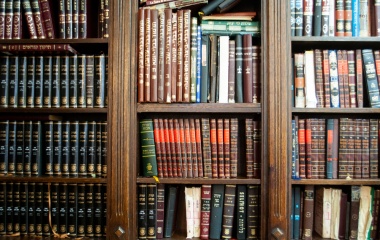
“Today I [Moshe] am 120 years old, and I can no longer come and go." (Devarim 31:2). After 40 years of dedicated leadership, it was time to turn the reins over to Yehoshua, who would be the one to lead during the conquest of the land of Israel. Despite the constant complaining that Moshe faced, the people were nervous about such a leadership transition at this crucial point in their history. Moshe reassured the people, telling them that good leaders are no more than G-d's messengers, and that in reality, "G-d your Lord will be the One who will go across before you; it is He who will destroy these nations before you." (31:3) While Yehoshua may "be the one who will lead you across", there is nothing to fear; "Be strong and brave…G-d your Lord is the One who is going with you and he will not fail you or forsake you." (31:6)
With the material concerns of the people alleviated, Moshe turned to matters of spiritual development. "Moshe then wrote down this Torah. He gave it to Levi's descendants, the priests in charge of the ark of G-d's covenant, and to the elders of Israel." (31:9) Our Sages claim that Moshe actually wrote 13 copies of the Torah, giving one to each of the twelve tribes, with the Torah of "Levi’s descendants" residing in the ark in the Mishkan and later in the Temple.
Torah in hand, Moshe instructed the people regarding the last two of the mitzvoth of the Torah. First, he explained Hakhel, the public reading of the Torah: "Gather together the people, the men, the women, children, and proselytes who dwell in your midst so that they may hear (the Torah), and they may learn and fear G-d and conscientiously fulfill all the words of this Torah." (31:12) Moshe followed this by telling B’nai Yisrael of the obligation for each Jew to write their own personal Torah: "Now write for yourselves this song (the Torah), and teach it to the Israelites; put it in their mouths." (31:19)
While both of these mitzvoth focus on the importance of Talmud Torah, they do so in distinctly different ways. The mitzvah to write our own Sefer Torah is a personal mitzvah. Each Jew is obligated to have the Torah as their personal companion, to study it and to observe it. Interestingly, the Shulchan Aruch (Yoreh Deah 270:2) rules that nowadays, with the Oral Law committed to paper, we can (actually must) fulfill this mitzvah by having a library of Jewish books. One must study Torah; the actual method by which this is to be done is almost secondary.
The mitzvah of Hahkel that precedes this mitzvah serves almost as a precondition to the personal sefer Torah. The focus is less on learning Torah, and more on experiencing Torah; the experience may be much more important even than the actual learning of Torah itself.
Hakhel was an awe-inspiring event. It took place in the Temple grounds, during the most joyous time of year (Sukkot) at the conclusion of a shmitta year; it culminated a year in which farmers had time to focus on spiritual matters, just as they prepared to head back to work. In the presence of the entire nation, the king in all his regalia would read from the Torah. Even (especially?) the little children had to participate.
Although children may be too young to actually understand the Torah, it is the experiences of youth that shape our world outlook. Surely, many of the adults did not understand the reading of the Law; the overwhelming experience was meant to leave an indelible mark on everyone. The national experience of celebrating the Torah could hopefully inspire each of them to write their own personal Torah.
Rav Soloveitchik often bemoaned the fact that while he had great success in teaching Torah, he felt he was unable to impart the passion of his religious feelings to his students. Contemporary Orthodoxy, the Rav wrote, "is well-grounded intellectually. However, its followers lack passion and enthusiasm. This deficiency is especially evident on Rosh Hashanah and Yom Kippur" (see the Rav's Yom Kippur Machzor, p. xviii).
May we merit the development of that passion for Torah, which is the surest way to inspire our children so that they will learn and experience the beauty of Torah.



